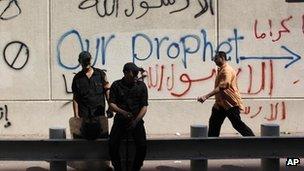Innocence of Muslims: Mystery of film-maker 'Sam Bacile'
- Published

The film first sparked protests in the Egyptian capital Cairo
New information is emerging over the origins of an anti-Islamic video which is at the centre of violent anti-American protests in Egypt and Libya.
A film was shot in the US, and was shown at a small cinema in Hollywood at the end of June. But it is the clips posted to YouTube, translated into Arabic, which appear to have sparked these protests.
The video - Innocence of Muslims - first appeared online on 1 July, posted in English by someone using the pseudonym "sambacile."
It was very badly made and cheaply produced, with poor acting and little in the way of storyline.
The most offensive comments about Islam and the Prophet Muhammad had been quite obviously dubbed onto the soundtrack afterwards and not spoken by the actors.
One actress featured in the film said she had no idea it would be used for anti-Islamic propaganda and condemned it.
Cindy Lee Garcia, from Bakersfield in California, was quoted by the website Gawker, external saying she had a small role in the film which she was told would be called Desert Warriors, about life in Egypt 2,000 years ago.
She threatened to sue the director for the way the actors were represented.
Questions asked
In fact a film called The Innocence of Bin Laden was shown at a small independent cinema on Hollywood Boulevard called the Vine Theatre on 30 June this year.
Someone present, who asked not to be identified, said it lasted about an hour, had very poor production values and attracted just a handful of viewers in the two showings that evening.
He said the man organising the screening was an Egyptian living in America who had hired two Egyptian security guards for the evening.
A man saying he was the writer and director, and claiming to be Sam Bacile, spoke to a number of media outlets, external on Tuesday, making inflammatory anti-Islamic comments in support of the film.
He claimed to be 52, or 56, depending on the source, and to be an Israeli-born Jewish estate agent who had raised millions of dollars from Jewish donors to make the film.
But prior to last week he did not exist online, except as the YouTube posting name, and there was no record of a developer of that name.
Questions started being asked, external over whether Sam Bacile was a real person.
An American right-wing extremist called Steve Klein, linked with various anti-Islamic groups in California, promoted the video, but said he did not know the identity of the director.
He contradicted himself in media interviews while expressing radical views, and eventually admitted he thought Sam Bacile was just a pseudonym.
Pastor Terry Jones from Florida, whose anti-Muslim actions have included burning Korans, said he had been in touch with a Mr Bacile over promotion of the film, but had not met him and could not identify him.
Coptic link?
Another name appeared linked to the film - Morris Sadek - an Egyptian American from the anti-Islamic National American Coptic Assembly.
His promotion of the movie brought inquiries into the involvement of Coptic Christian groups.
The Copts make up a sizeable Christian minority in Egypt and some have raised concern about their religious freedom in the new Egypt under a Muslim Brotherhood president.
The Associated Press news agency, which had interviewed the man claiming to be Sam Bacile on the telephone, then followed a trail, external to a Californian called Nakoula Basseley Nakoula, 55, who told AP he was a Coptic Christian and admitted he was involved in logistics and management of the film's production.
He denied being the director or posing as Sam Bacile, but AP said reporters had traced the phone number to an address near where they found Mr Nakoula.
The exact origin of the movie and the internet clip, and the motivation behind its production, remains a mystery, but it appears not to be linked to an Israeli film-maker as was earlier widely reported, including by the BBC.
It was the film's translation into Arabic and broadcast on Arab TV stations and talk shows which sparked the violence - although investigations are now under way in Washington to establish whether the worst of the violence was not spontaneous.
The religious Egyptian TV channel al-Nas showed clips from the video, dubbed into Arabic, and scenes posted online have been viewed hundreds of thousands of times.
- Published12 September 2012
- Published12 September 2012
- Published12 September 2012
- Published12 September 2012
- Published11 September 2012